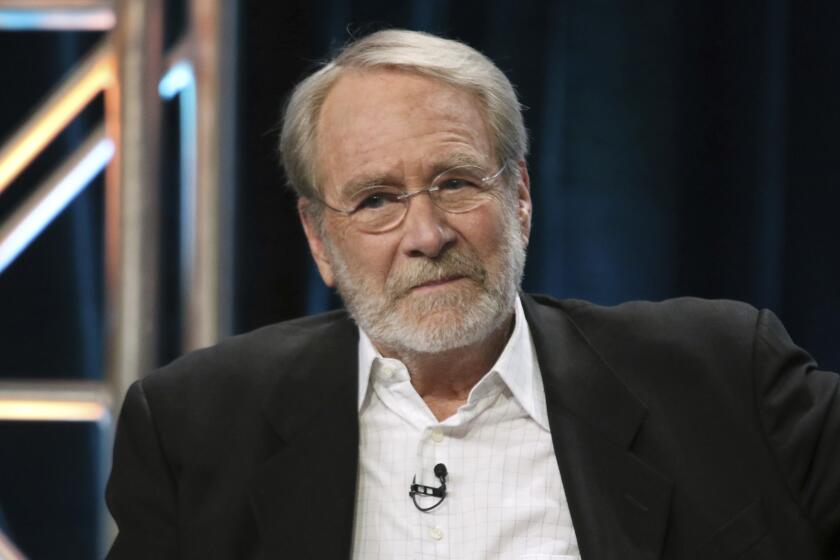‘We Are Being Beaten’ : Turning Up the Volume on Painful Issues, Pearl Cleage Pushes Women to Stop Racism, Sexism
Pearl Cleage thrives on those messy moments when honesty’s rough edges ignite emotionally frank discus sions. “Weird race moments,” she pegs them, such as one working itself to a rapid, almost scalding boil during her visit to Westwood’s Sisterhood Bookstore.
A woman, standing at the fringes of the crowd, her blond hair pinned in a loose chignon, raises her hand at the close of Cleage’s reading. She’s most touched, she says, by Cleage’s essay “Mad at Miles,” which takes an ax to the ornate pedestal that jazzophiles have so lovingly erected for the late trumpet legend--Miles Davis.
Cleage, an Atlanta Tribune columnist and performance artist, scorns his violence against women: “The question is: How can they hit us and still be our heroes? . . . Our leaders? Our husbands?”
Cleage, fine-boned, with close-cropped brown hair, her slight frame draped in flowing sea-foam green tunic and matching roomy trousers, nods vigorously as the woman underscores her point by offering examples culled from her own experience.
The genial drift, however, blows off course when the woman says the “certain twang” of Cleage’s speaking voice doesn’t square with her fair-skinned features. “You sound black . . .” the woman’s voice wavers, her hands fluttering nervously as if picking adjectives from air.
Eyeing the other women seated ringside--ears cocked, arms crossed and now sitting straighter in their pink folding chairs--Cleage offers a warning: “I’m looking at the sisters up here,” she says, her voice still light, but her eyes sharp, sober. “You’re skating on thin ice.”
The woman pauses, collects her thoughts: “But you don’t . . . well. . . look black,” she struggles out. Cleage lifts only an eyebrow and proceeds in a softer voice, only a half-shade above a whisper. “Now,” she nods, concealing the edges of a smile, “you’ve just fallen through.”
The women in the pink chairs exchange knowing, loaded looks, and their stares bore into the blond woman standing only a few feet away. “Here we go . . . “ says one under her breath.
The blond woman continues: “But you know what I mean? I’m just your generic, all-American girl and . . . “
Cleage interrupts, pushing for clarification, moving the vague to the concrete: “No, see I don’t know what that means. It only proves that race in America is really (fouled) up and complicated.”
Instantly, the civilized setting among books and literate folk becomes a treacherous minefield; the assembly, in a feat as painful as it is exhilarating, struggles toward fresh language and more effective ways to embark on gainful discussions of race.
With racism and sexism, Cleage has found it the only way to plumb for real truth. Politeness is dangerous. Silence is deadly. Closed mouths and minds have unraveled relationships, communities and will, ultimately, she believes, undo this precariously attached country.
Pushing people to challenge what they feel too timid or clumsy to explore, Cleage avows, is the best first step to combat ignorance.
In her new book, “Deals With the Devil (And Other Reasons to Riot),” published by Ballantine Books, Cleage raises the volume on these uncomfortable issues.
*
Born in Detroit, Cleage lives in Atlanta and works as a playwright, columnist and liberal arts professor at Spelman College. The daughter of a charismatic minister whose activist spirit imbues the vivid survival messages she passes down, Cleage knows a little about the magic powers of persuasion.
“We have a legitimate discussion about drugs in African-American communities. We are conscious of every nuance of race,” Cleage tells her Sisterhood audience. “But as African-American women, we have to be conscious of sexism. We have to be conscious of the fact we are being beaten.”
Sexism and violence against women are often forbidden topics in many African-American social circles, she says, considered dirty laundry never to be aired publicly. And though invariably the climate will be charged, the outcome uncertain, Cleage forces such uncomfortable confrontations--face-to-face and on the page.
She writes for women consumed in the madness of domestic violence, for those teetering around it, and those just rising above it. She hopes her words will provide direction, when movements or platforms haven’t--or can’t.
Although some black men have echoed not-so-quiet murmurings of “male bashing” in her direction, Cleage’s collection could be looked at as a bible, not only for black women, but men and women of all races struggling out of their chaos. “I’m always trying to change the way people think so that they will change the way that they are living,” she says.
Though her lyric style is raw, often provocative, Cleage attempts to find an internal balance: “I think I’m very passionate, but not in the sense of trying to make people respond in anger. I don’t think it gets me any place.”
And she believes fruitful discussions about race, class and/or gender issues start with a clear head and a well-honed argument: “I’m always hoping that people are acting out of ignorance when they do something that is sexist or racist. I know that there is a huge percentage of people who don’t have any good information. And I’m trying to convey that information without diluting it.”
Her book is far from polite apologia, a color-by-number workbook. “When we as black writers are trying to talk to people other than African-Americans . . . about race, we’re so conscious of being nice and not offending them that we don’t tell them anything,” she says. “All these careful books about race do us a disservice because (race) continues to be something we can talk about at barely integrated cocktail parties.”
Cleage wants to clarify the motives and the method: She isn’t preaching, pontificating or embarking on “missionary work.” Whittling the stuff of domestic storms down to preventive primer do’s and don’ts, she’s unafraid of tipping the careful balance and getting dirty while digging for solutions.
Especially when it comes to men and women.
“Surely,” writes Cleage, “I understood the danger of and divisiveness of perpetrating such ‘negative images’ of black men . . . Although all African-American insanity, male and female insanity, can ultimately be explained by the long-ago presence of the slave ships pulling up on the coast of Africa, that blood-soaked presence cannot continue to be an acceptable reason for our current sorry state . . . Racism is a heavy burden to bear and can make black men feel mean and hostile and crazy because it makes black women feel crazy too.”
Carole Simmons, Cleage’s editor at the Atlanta Tribune, says the paper does get letters accusing Cleage of male bashing, while she occasionally ruffles the feathers of the city fathers.
But in Atlanta, whether they may ultimately like it or not, people want to know what Cleage has to say. “They call it ‘The Pearl Tribune.’ ” says Simmons, “because she speaks to you in your language--whether you are a postal worker, a CEO or a waitress. Pearl is a feeling. She is our voice. She is the voice of women being beaten; of men who are trying make it in a hostile society. She tells the rest of Atlanta and the rest of the world . . . the things that we can’t find the words to say.”
The 38 essays in her new book, most previously published in the Tribune, run the gamut from musings on Anita Hill, Arsenio Hall, Magic Johnson, Bill Clinton, Spike Lee and the persistent specter of “Miss Daisy” to solitude, rapture, motherhood, integration and what she calls “the other facts of life”--teaching women to protect themselves, to spot danger signs so they may be able to save someone’s life--maybe their own.
*
KABC talk-jock Michael Jackson unleashes his interpretation with a wily smile, shocking Cleage out of the warm glow of an introduction he bestowed mere moments before: “You don’t like black men?”
It is her first stop on the three-day L.A. leg of her book tour; and it’s the question that will haunt her at every turn.
“I don’t like violent black men,” Cleage corrects.
She keeps her head through what lies on the other side of the urgently blinking console lights, the rage of disembodied voices over the phone lines: Black men who feel that they are more victimized than black women; black women who live in fear of their next mate; a black man who recalls that his mother could hurt him more “by what she said than by raising her hand”; a black man fed up with always being the bad guy--”It’s not just black men.”
Cleage carefully addresses their rage with sober understanding. Hands folded, voice steady, she walks the edges of composure.
Later, at Inglewood’s Eso Won Books, the crowd is all black, mostly women, who Cleage cautions to “be aware of the dangers in our neighborhood--race as well as sex.” The men she bolsters and encourages, those especially who are gentle “good brothers.”
After the reading, one man, who has sat quietly, absorbing her words, approaches his question carefully. “Is my perception correct?” he begins, testing the waters. “My perception is that strong black women are anti-male?”
Cleage responds, voice even: “Your perception is totally in correct. There’s some very anti-female behavior going on when brothers shoot, rape or scald my sisters.”
Too often, Cleage observes, conversation derails into cat fights centering on who is more victimized. She wants to diffuse the charged atmosphere of such settings--men and women talking about the future; more importantly, their futures.
“She values black people,” says Ronnie Brown, who stopped by because he’d heard Cleage rattling some closeted intra-racial skeletons on radio. “A lot of us claim to be concerned African-Americans. We don’t want to admit that there might be some problems.”
Adds James Fugate, co-owner of Eso Won: “She’s talking about a topic black males who read and think don’t like to talk about. There are too many women walking around battered psychologically--we need more serious thinkers like her addressing these things in the black community.”
Cleage believes her nurturing tone is often overshadowed by the severe truths she must impart: “People never look at the fact that I say black men in some cases are abusive . . . I have stories about Zeke (her companion) risking his life (to help women). They jump right over it. I think that men get stuck on that . . . because they are so used to feeling attacked. . . . I’m not bashing men, I’m trying to talk about addressing the life-and-death problem of abuse.”
But lodged amid the world-weary words of fragmented communication, dead-end journeys, Pearl Cleage attempts to resuscitate the fragile notion of love. It’s difficult, she says, for people to reach out, mostly because they fear the consequences--and reality: “This is a scary time in this country. So what we do is pretend that everything is OK. And then we’re surprised: ‘Oh my God, I can’t believe those angry people burned everything in L.A.’ ”
And she wants black women to not only find their voices, but speak them and understand that the notion of “liberation” has less to do with the shade of one’s skin than the hue and cry of a universal struggle toward respect and power.
“Part of the reason why black women have a hard time with feminism is because we are encouraged by men in our community to see feminism as a ‘white thing,’ ” Cleage says. “It’s hard to come back from that because the feminist movement in this country is definitely in the hands of middle-class white women. And basic questions, class issues, have often not been addressed in a way that drew women of color into the discussion.”
But, above all, Cleage is most interested in deeds, not words.
“I’m less interested in what people call themselves than in what they do. How they live their lives,” she says. “If they are working in neighborhoods, raising their children and struggling to build positive relationships with women and men, then I call that a feminist.
“If they call that ‘a good strong black woman,’ that’s fine too.”
More to Read
The biggest entertainment stories
Get our big stories about Hollywood, film, television, music, arts, culture and more right in your inbox as soon as they publish.
You may occasionally receive promotional content from the Los Angeles Times.






